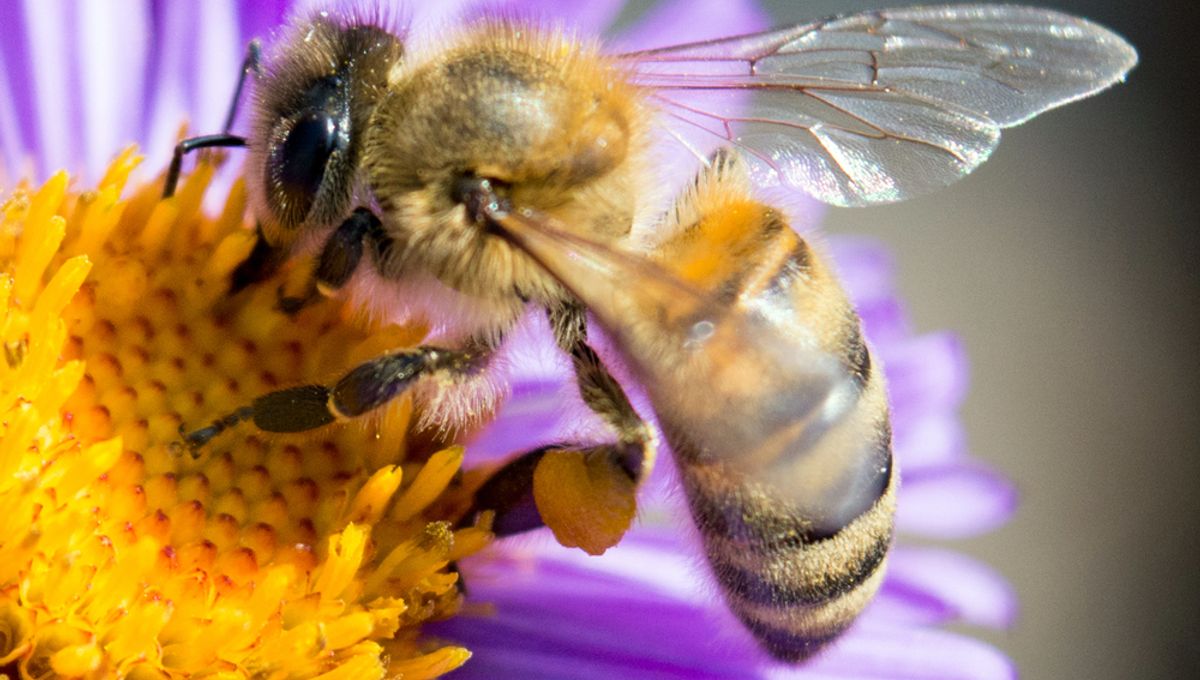
Honeybees display a reduced ability to maintain a straight course after being exposed to common pesticides, according to a new study in the journal Frontiers in Insect Science. Worryingly, the bees’ impaired coordination was correlated with elevated neuronal death in the optic lobe following the ingestion of “sublethal doses” of two agricultural chemicals.
“Our results are reason for concern because the ability of bees to respond appropriately to visual information is crucial for their flight and navigation, and thus their survival,” said study author Dr Rachel Parkinson in a statement.
The researchers sought to determine how exposure to pesticides affects honeybees’ optomotor response, which they rely on to maintain a straight trajectory when flying or walking. To test this, the study authors captured wild bees from a location in Massachusetts where no nearby fields had been treated with insecticides.
The bees were then split into four groups, one of which was fed a diet of unadulterated sucrose over the course of five days. The other groups were supplied with sugar water that was contaminated with either the neonicotinoid pesticide imidacloprid, a sulfoximine insecticide called sulfoxaflor, or a combination of the two.
The researchers then tracked the insects’ movement as they responded to videos of vertical bars moving horizontally across two screens. This creates the optical illusion of being blown off course, challenging the bees’ optomotor response to steer them back onto a straight line.
Compared to those that had not ingested any pesticides, the bees exposed to pesticides were much worse at correcting their course and tended to display asymmetrical responses, whereby sharp turns were only executed in one direction. At other times, the exposed insects failed to adjust their course, or only produced shallow turns when a larger movement was required.
On the whole, sulfoxaflor caused greater impairment than imidacloprid, although all pesticide-exposed honeybees displayed an asymmetry that was at least 2.4 times greater than that of non-exposed bees. According to the study authors, this may reflect how these chemicals affect one half of the brain more strongly than the other.
Alternatively, this asymmetry might indicate that pesticides exert an uneven influence over “head roll stabilization which could impair the magnitude of the response in one direction.”
Molecular analysis revealed that the two insecticides also downregulated the expression of genes that coordinate the removal of toxins from the brain. This, in turn, led to an increase in oxidative stress, which ultimately resulted in the death of neurons within the bees’ optic lobes. Given that these brain structures process visual input, it is easy to see how the use of pesticides may impair insects’ navigation abilities.
“Neonicotinoid and sulfoximine insecticides activate neurons in the insect brain and are not always recycled fast enough to prevent toxicity,” explained Parkinson. “The effects we observed could be due to a type of rewiring in the brain: to prevent neural damage by reducing the sensitivity of neurons to these compounds.”
Having said that, the authors insist that these mechanisms are unlikely to fully explain the impairment of the bees’ optomotor response and that more pathways are likely to be involved.
Regardless of the underlying cause, though, Parkinson says that “the major concern is that – if bees are unable to overcome any impairment while flying – there could be profound negative effects on their ability to forage, navigate, and pollinate wildflowers and crops.”
Source Link: Pesticides Kill Bees’ Brain Cells And Impair Their Ability To Walk Straight